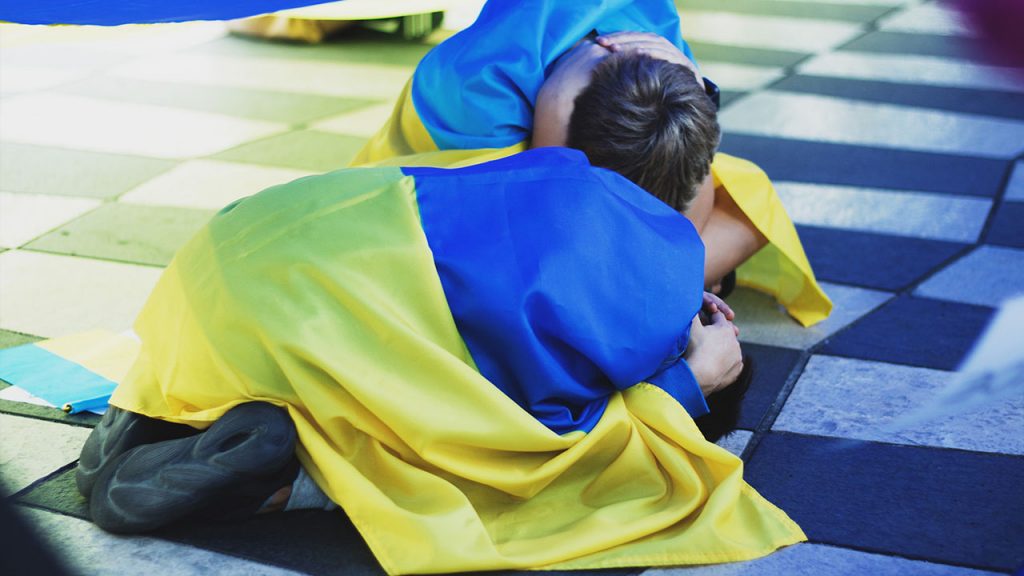
UN Human Rights Day December 10th: 1,000s of children kidnapped by Russia should not be forgotten, says Human Rights Without Frontiers
Date : December 11, 2023
UN Human Rights Day is celebrated annually around the world on December 10th every year. The date was chosen to honour the United Nations General Assembly’s adoption and proclamation, on December 10th 1948.
On UN Human Rights Day, December 10th, thousands of Ukrainian children kidnapped and deported by Russia, whose parents are desperately searching for a way to get them home should not be forgotten by the international community, said the Brussels-based NGO, Human Rights Without Frontiers, in a press release issued today.
On December 6th, President Zelensky announced in his daily address that 6 children deported to Russia from Ukraine’s Occupied Territories had been released with the mediation of Qatar.
All in all, less than 400 Ukrainian minors have been rescued in various separate and individually designed special operations, according to the platform Children of War created on behalf of the Office of the President of Ukraine by various official Ukrainian institutions.
The same platform has posted the pictures, names and dates of birth with the place of disappearance of 19,546 deported children and their number continues to grow.
Alona Lebedieva, the founder of the Aurum Charitable Foundation told EU Today: “By its actions, Russia cynically violates a number of international documents, in particular, the articles of the Convention on the Rights of the Child, a document that has received the widest international recognition among all human rights documents.
“First, such important ones as the sixth article of the Convention guaranteeing children the protection of their health and life, thirty-seven, which states that no child shall be subjected to torture or other cruel, inhuman or degrading treatment or punishment and the eighth, which guarantees the right to choose citizenship.
“In addition, acts of aggression by one state against another are considered a crime in UN documents, this is also stated in the twenty-ninth article of the Convention on the Rights of the Child. But in reality, Russia completely ignores this and educates in children a positive perception of the act of aggression and occupation.
“”That is, today we are talking about the fact that, in theory, we have a large number of various important documents in which everything is supposedly settled and clearly written. But the example of Ukrainian children made it clear that there is no single system of child safety in the world. All this only works if the game is played according to the rules.
“That is, the deportation of Ukrainian children is not only the pain of the Ukrainian people, while our children are in danger, no other child in the world can feel protected either. So, in my opinion, the main thing now is to unite a powerful international community in order to develop new effective mechanisms as quickly as possible.”
Statistics: 20,000? 300,000? 700,000?
It is impossible to establish the exact number of deported children given the ongoing full-scale aggression, difficult access to the temporarily occupied territories and the failure of the Russian side to provide reliable information on this matter.
Daria Herasymchuk, Adviser to the President of Ukraine on Children’s Rights and Children’s Rehabilitation, notes that the aggressor country, Russia, could have illegally deported up to 300,000 children from Ukraine during the war.
As of June 2023, the Interdepartmental Coordination Headquarters of the Russian Federation for Humanitarian Response indicated in its statement that since 24th February 2022, 307,423 children have been taken from Ukraine to the territory of Russia.
Russia’s Commissioner for Children’s Rights Maria Lvova-Belova said that the number of such Ukrainian children is more than 700,000.
Russia cynically calls the illegal transfer of Ukrainian children an “evacuation” but the UN panel of inquiry concluded that none of the cases it examined was justified on safety or health grounds, nor did they meet the requirements of international humanitarian law.
Russian authorities are creating obstacles to prevent Ukrainian children from being reunited with their families.
In its report on the issue, the OSCE notes that the Russian authorities began working on the “transfer” of Ukrainian children for adoption or care by Russian families since 2014, after the occupation of Crimea.
According to the Russian program Train of Hope anyone from any part of the country could adopt Ukrainian children from Crimea, who were then granted Russian citizenship.
At the end of September 2022, Russian President Vladimir Putin signed a decree on the “accession” to the Russian Federation of the partially occupied regions of Zaporizhzhia, Kherson, Donetsk and the occupied region of Luhansk in Ukraine.
After that, children from these newly occupied regions also began to be enrolled as citizens of the Russian Federation and forcefully adopted.
On March 17th 2023, the International Criminal Court issued an arrest warrant for Russian President Vladimir Putin and Russian Presidential Commissioner for Children’s Rights Maria Lvova-Belova for the war crime of unlawful deportation of population and unlawful transfer of population from occupied areas of Ukraine to the Russian Federation, in prejudice of Ukrainian children.
Recommendations
- Human Rights Without Frontiers supports the recommendations of the UN Secretary-General, who urges
- Russia to ensure that no changes are made to the personal status of Ukrainian children, including their citizenship;
- All parties to continue to ensure that the best interests of all children are respected, including by facilitating family tracing and reunification of unaccompanied and/or separated children who find themselves outside borders or control lines without their families or guardians;
- Parties to the conflict to grant child protection authorities access to these children to facilitate family reunification;
- His Special Representative on “Children and Armed Conflicts’, together with United Nations agencies and partners, to consider ways to facilitate such processes.
